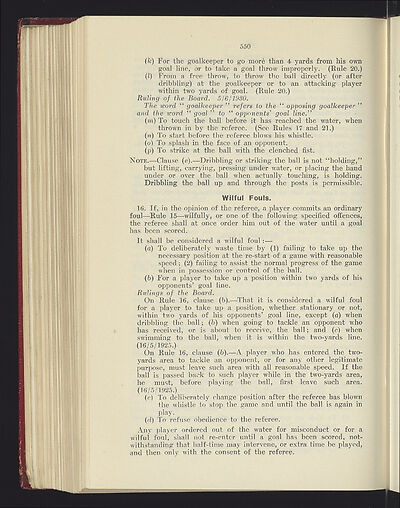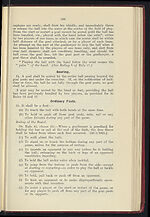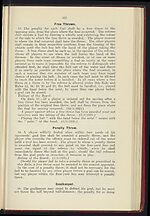1931
(568)
Download files
Complete book:
Individual page:
Thumbnail gallery: Grid view | List view

550
I
1
it
(k) For the goalkeeper to go more than 4 yards from his own
goal line, or to take a goal throw improperly. (Rule 20.)
(l) From a free throw, to throw the ball directly (or after
dribbling) at the goalkeeper or to an attacking player
within two yards of goal. (Rule 20.)
Reeling of the Board. 5/6
/
1930.
The word " goalkeeper " refers to the " opposing goalkeeper "
and the word " goal " to " opponents' goal line."
(m) To touch the ball before it has reached the water, when
thrown in by the referee. (See Rules 17 and 21.)
(n) To start before the referee blows his whistle.
(o) To splash in the face of an opponent.
(p) To strike at the ball with the clenched fist.
NOTE
.—Clause (e).—Dribbling or striking the ball is not "holding,"
but lifting, carrying, pressing under water, or placing the hand
under or over the ball when actually touching, is holding.
Dribbling the ball up and through the posts is permissible.
Wilful Fouls.
16. If, in the opinion of the referee, a player commits an ordinary
foul—Rule 15—wilfully, or one of the following specified offences,
the referee shall at once order him out of the water until a goal
has been scored.
It shall be considered a wilful foul :—
(a) To deliberately waste time by (1) failing to take up the
necessary position at the re-start of a game with reasonable
speed; (2) failing to assist the normal progress of the game
when in possession or control of the ball.
(b) For a player to take up a position within two yards of his
opponents' goal line.
Ridings of the Board.
On Rule 16, clause (b).—That it is considered a wilful foul
for a player to take up a position, whether stationary or not,
within two yards of his opponents' goal line, except (a) when
dribbling the ball; (b) when going to tackle an opponent who
has received, or is about to receive, the ball; and (c) when
swimming to the ball, when it is within the two-yards line.
(16/5/1925.)
On Rule 16, clause (b).—A. player who has entered the two-
yards area to tackle an opponent, or for any other legitimate
purpose, must leave such area with all reasonable speed. If the
ball is passed back to such player while in the two-yards area,
he must, before playing the ball, first leave such area.
(16/5 /1925.)
(c) To deliberately change position after the referee has blown
the ..whistle to stop the game and until the ball is again in
play.
(d) To refuse obedience to the referee.
:any player ordered out of the water for misconduct or for a
wilful fool, shall not re-enter until a goal has been scored, not-
withstanding that half-time may intervene, or extra time be played,
and then only with the consent of the referee.
I
1
it
(k) For the goalkeeper to go more than 4 yards from his own
goal line, or to take a goal throw improperly. (Rule 20.)
(l) From a free throw, to throw the ball directly (or after
dribbling) at the goalkeeper or to an attacking player
within two yards of goal. (Rule 20.)
Reeling of the Board. 5/6
/
1930.
The word " goalkeeper " refers to the " opposing goalkeeper "
and the word " goal " to " opponents' goal line."
(m) To touch the ball before it has reached the water, when
thrown in by the referee. (See Rules 17 and 21.)
(n) To start before the referee blows his whistle.
(o) To splash in the face of an opponent.
(p) To strike at the ball with the clenched fist.
NOTE
.—Clause (e).—Dribbling or striking the ball is not "holding,"
but lifting, carrying, pressing under water, or placing the hand
under or over the ball when actually touching, is holding.
Dribbling the ball up and through the posts is permissible.
Wilful Fouls.
16. If, in the opinion of the referee, a player commits an ordinary
foul—Rule 15—wilfully, or one of the following specified offences,
the referee shall at once order him out of the water until a goal
has been scored.
It shall be considered a wilful foul :—
(a) To deliberately waste time by (1) failing to take up the
necessary position at the re-start of a game with reasonable
speed; (2) failing to assist the normal progress of the game
when in possession or control of the ball.
(b) For a player to take up a position within two yards of his
opponents' goal line.
Ridings of the Board.
On Rule 16, clause (b).—That it is considered a wilful foul
for a player to take up a position, whether stationary or not,
within two yards of his opponents' goal line, except (a) when
dribbling the ball; (b) when going to tackle an opponent who
has received, or is about to receive, the ball; and (c) when
swimming to the ball, when it is within the two-yards line.
(16/5/1925.)
On Rule 16, clause (b).—A. player who has entered the two-
yards area to tackle an opponent, or for any other legitimate
purpose, must leave such area with all reasonable speed. If the
ball is passed back to such player while in the two-yards area,
he must, before playing the ball, first leave such area.
(16/5 /1925.)
(c) To deliberately change position after the referee has blown
the ..whistle to stop the game and until the ball is again in
play.
(d) To refuse obedience to the referee.
:any player ordered out of the water for misconduct or for a
wilful fool, shall not re-enter until a goal has been scored, not-
withstanding that half-time may intervene, or extra time be played,
and then only with the consent of the referee.
Set display mode to:
![]() Universal Viewer |
Universal Viewer | ![]() Mirador |
Large image | Transcription
Mirador |
Large image | Transcription
| Games and sports in the army > 1931 > (568) |
|---|
| Permanent URL | https://digital.nls.uk/248678759 |
|---|
| Description | 'Games and Sports in the Army' was an annual publication produced by the British War Office between the 1930s and 1960s. This included the Second World War. It outlines the rules and regulations for games and sports played by members of the armed forces. It features names and photographs of team members, and examples of contemporary advertising. |
|---|---|
| Shelfmark | GWB.52 |

